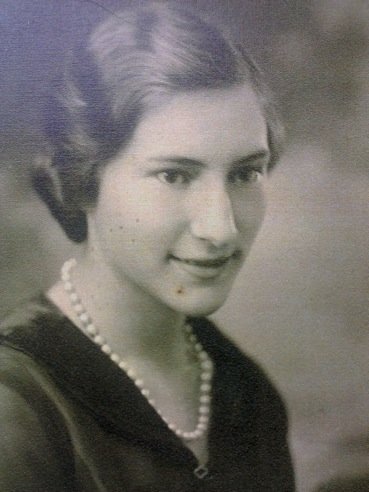Mary Etta Klatt
KNOX — Inspired by nature and a distinguished lineage, Mary Klatt resolved to meet the demands of farm life and supporting a large family.
Mrs. Klatt died on Tuesday, Aug. 20, 2013. She was 98.
Mary Etta Klatt was born on Nov. 20, 1914, in St. Paul, Minn., to the late William Coombs Manship and Mary Rose (née Kraimer) Manship. She labored with her family near Bald Eagle Lake in Minnesota, feeding and milking the animals, and weeding and hoeing their one-acre vegetable garden. Without electricity, water was pumped by hand, and an outhouse was used through 30-below Minnesota winters.
“One of the things she told us kids was that, because she worked so hard as a kid, she wasn't going to make us work that hard,” said her daughter, Catherine Klatt.
Mrs. Klatt worked on dairy farms with her husband, Otto Nathan Klatt, through what their daughter described as the boom-and-bust cycle of farm income.
“There would be times that were very, very difficult, and Dad would be very nervous…” said Ms. Klatt. “Mom may have been worried on the inside, but she just coped. She figured out how to get by, how to do it….And she always seemed to have the inner resources to be strong in that way, that inner knowledge that, ‘Yeah, we were going to get through this,’ the inner strength to say, ‘Okay, we can't afford clothing. I’ll pull apart this old dress and remake it into a blouse for my kids.’”
Mrs. Klatt was salutatorian of White Bear High School and studied social work at the University of Minnesota. She would attend classes for a quarter term, her daughter said, then stop to work in order to save the $25 for tuition. She became discouraged after a few years and met Mr. Klatt at a dance.
“Dad went up to her and Dad thought he was asking if he could sit next to her, and Mom thought he was asking if she could dance, so she stood up, and that was that,” said Ms. Klatt. They were married in 1940 and moved in with Mr. Klatt’s parents in New Brighton, Minn. After his father died of multiple sclerosis, they sold the farm and bought another in New Richmond, Wisc.
To Mrs. Klatt’s disappointment, they eventually sold the farm, her daughter said, because Mr. Klatt hated farming. From an early age, he did most of the physical work on the farm because his father had been disabled by his disease.
The Klatts opened a farm-equipment store in Centuria, a small Wisconsin village, around 1949. Mrs. Klatt was nine months pregnant with their second child and took care of bookkeeping.
Around seven years later, they liquidated the store and moved to Deluth, Minn., where Mr. Klatt managed a home-and-garden store. A fire burned the store, and he struggled to find stable work for six months. Mr. Klatt eventually became a territory manager for Minneapolis-Moline farm machinery company.
Ms. Klatt said her mother didn’t show worry, if she had it.
“Growing up in that farm community, I think women were like that more,” her daughter said.
A sense of fearlessness and willingness to try new things was a family quality. If Mrs. Klatt’s children wanted to ride their bikes around Bald Eagle Lake, if they wanted to build a fort, if her son wanted to spend his time experimenting with electricity in their basement, or her daughter had to keep dead animals in their freezer to study later, it was all fine.
Ms. Klatt attributed her mother’s resolve to her being raised in a depressed economy and working on farms.
“Part of it came from her parents. Her mother had had a very difficult life and was very much the strong, stoic German, and so she learned that way of coping with life: you just do it,” Ms. Klatt said. There was also an expectation of excellence, being a Manship. She was proud of her heritage, which included a great-grandfather who was the mayor of Jackson, Miss. when it was surrendered during the Civil War. She had a poet, an artist, and a world-famous sculptor, Paul Manship, among her relatives.
Ms. Klatt said her mother refused to join the Daughters of the American Revolution after the DAR wouldn’t let African-American singer Marian Anderson perform in its Constitution Hall, leading to her famous performance in front of the Lincoln Memorial in 1939.
Mrs. Klatt’s mother and mother-in-law lived with the Klatts. “There were nine of us in this tiny house,” her daughter said. “So it was a very full, very rich way to grow up.”
Mr. Klatt’s mother, who baked bread for the house, had been a teacher in the Dakotas and told stories of getting lost in blizzards and being chased by bulls.
Family dinners were quiet, Mrs. Klatt said, but Mr. Klatt was a fiddle player at dances and played music with his family. They sometimes played arrangements of Christmas songs together, with trombones, a clarinet, piano, and Mr. Klatt on the violin.
“Oh, it was horrible,” said Ms. Klatt.
Mrs. Klatt read widely, with a collection of old books inherited from her parents when she moved back to their home on Bald Eagle Lake around 1960. Ms. Klatt guessed that her mother’s passion for books came from her own mother, who educated herself by reading after she dropped out of school after third grade. As she grew older, her daughters, Lois and Catherine, invited her to live with them in Knox, where she spent her last 17 years. She was excited to be in a new place, her daughter said, and she was connected to the Altamont Reformed Church.
They went on trips together, including camping on Cape Cod.
“There she was in her seventies, sleeping on an air mattress that flattened in the middle of the night, and she loved it, too,” said Ms. Klatt.
Mrs. Klatt had a deep affection for nature and animals, especially her daughters’ retired racing greyhound, Viya. In her later years, when Mrs. Klatt was in a wheelchair, her daughters took her down Quay Road to look at the wildflowers blooming.
“She inspired others with her caring and gentle nature and her wisdom…” her family wrote in a tribute. “She was a sweet woman who was inspired by nature.”
****
Mary Etta Klatt (née Manship) is survived by her children, Richard and his wife, Patte; Barbara; Lois; William and his wife, Linda; and Catherine. She is also survived by her sister-in-law, Stella; her nine grandchildren, 11 great-grandchildren, nieces and nephews, and a gracious family.
Her sister, Florence, died before her, as did her brothers, Bill, Paul, and Edward, and her husband, Otto Nathan Klatt.
A memorial service will be held at the Honsa Family Funeral in White Bear Lake, Minn. on Saturday, Aug. 24 at 11 a.m. with a calling hour at 10 a.m. Earlier calling hours will be Friday, Aug. 23 from 5 to 8 p.m.
Mrs. Klatt had a life-long wish that no one go hungry. Memorial donations may be made to Union Gospel Mission Department of Donor Services, 77 Ninth Street East Saint Paul, MN 55101, or to a food pantry of choice.
— Marcello Iaia


